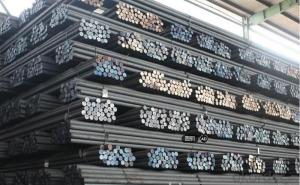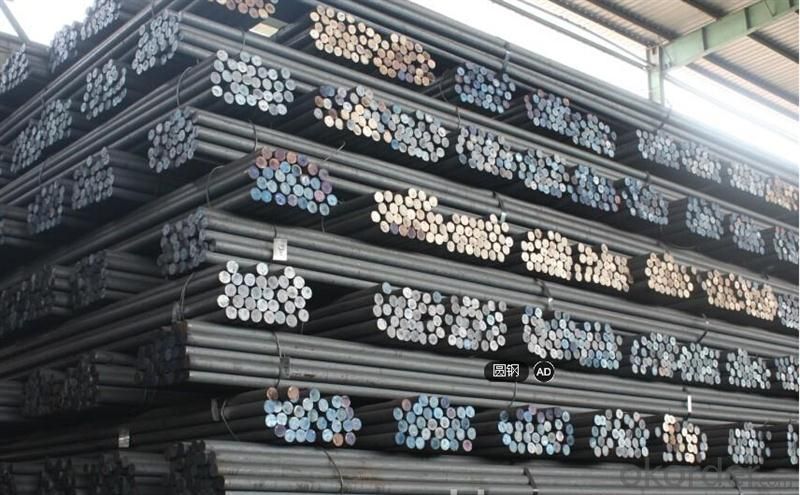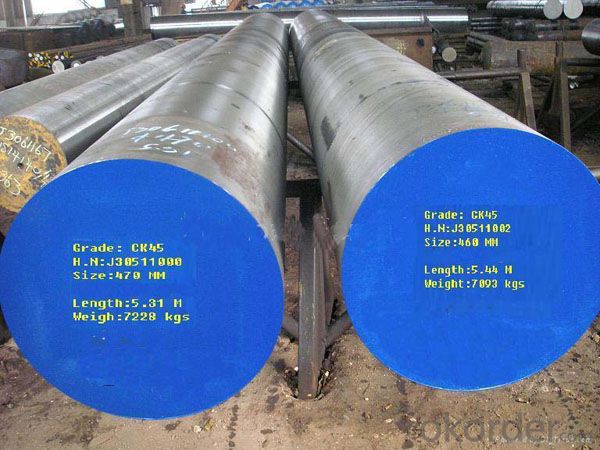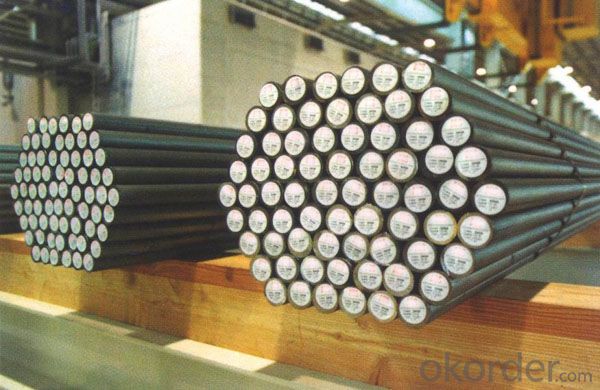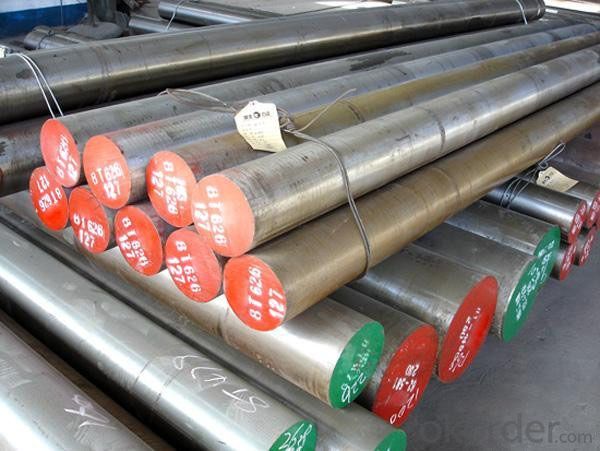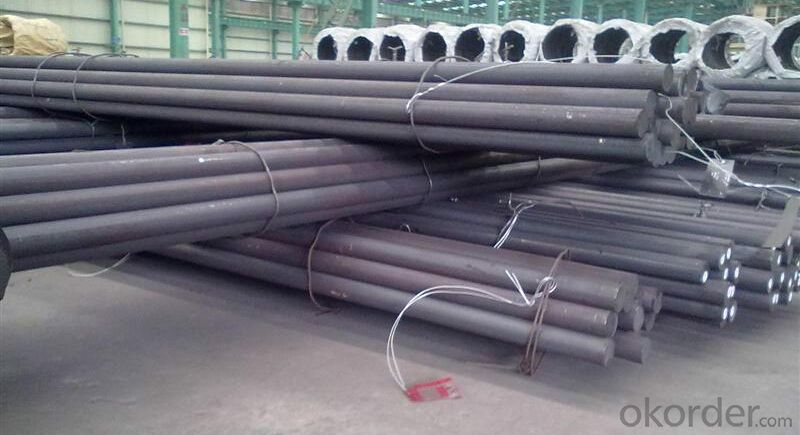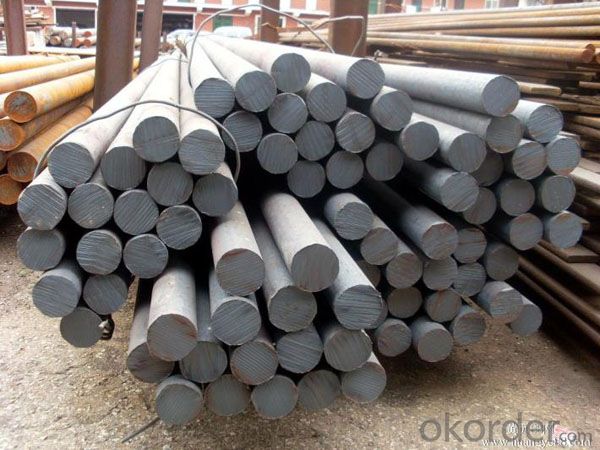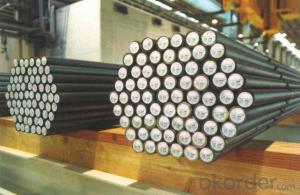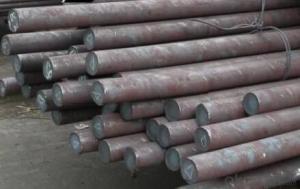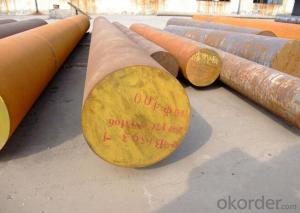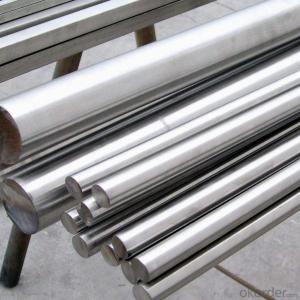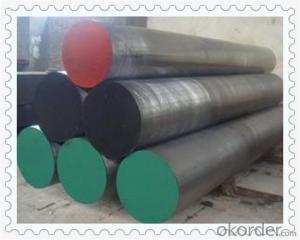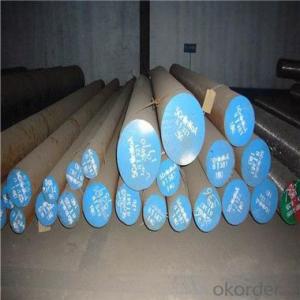Special Steel 8620H 40CrNiMoA Iron Round Steel Bar
- Loading Port:
- Qingdao
- Payment Terms:
- TT OR LC
- Min Order Qty:
- 5 m.t.
- Supply Capability:
- 100000 m.t./month
OKorder Service Pledge
Quality Product, Order Online Tracking, Timely Delivery
OKorder Financial Service
Credit Rating, Credit Services, Credit Purchasing
You Might Also Like
Specification
Type:
Carbon Steel,Spring Steel,Bearing Steel,Gear Steel,Deformed Steel,Stainless Steel,Alloy Steel
Shape:
Steel Coil,Steel Sheet,Steel Wire Rod,Steel Flat Bar,Steel Square Bar,Steel Angle,Steel Round Bar,Steel Billets
Technique:
Hot Rolled,Cold Rolled,Cold Drawn,ERW,Forged,Saw,Extruded,EFW,Spring
Surface Treatment:
Galvanized,Coated,Copper Coated,Color Coated,Oiled,Dry,Chromed Passivation,Polished,Bright,Black,PVDF Coated
Certification:
ISO,SGS,BV,IBR,RoHS,CE,API,BSI,UL
Thickness:
50-500mm
Width:
50-500mm
Length:
6-12m
Outer Diameter:
50-500mm
Net Weight:
92kg-18510kg
Packaging:
Seaworthy packaging
Special Steel 8620H 40CrNiMoA Iron Round Steel Bar
Detailed Information of Special Steel 8620H 40CrNiMoA Iron Round Steel Bar
| Name | Steel Round Bar |
| Shape | Round Bar/Square Bar/Flat Bar/Plate/Wire |
| Standard | GB/ASTM/SAE/AISI/DIN/JIS/EN/BS |
| Surface Treatment: | Black/Peeling/Polished/Machined |
| Delivery Condition: | Hot Rolled or Forged/Peeled or Black Surface |
| Test | SGS/UT 100% Elements Testing |
| Certificate: | ISO/Mill Certificate |
| Service: | 24 hours online service / |
| more than 20 years trading and manufacture | |
| Quality Assurance: | the third party inspection, such as SGS, BV, TUV…etc. is acceptable |
| Packaging Details: | Seaworthy Packaging or as per customer's packing instruction |
Product Overviews of Special Steel 8620H 40CrNiMoA Iron Round Steel Bar
| Product Name | Typical Grades | Diameter(mm) | Standard Adopted |
| Carbon Steel | 20 (1020/S20C/C22) | ||
| 40 (1040/S40C/C40) | Ø16-Ø300 | ||
| 45 (1045/S45C/C45) | |||
| Bearing Steel | GCr9 (51100/SUJ1) | ||
| GCr15 (52100/SUJ2/100Gr6) | Ø12-Ø250 | ||
| GCr9SiMn (A485-Gr.1/SUJ3) | GB/SAE/ | ||
| Cr-Mo Steel | 20Cr (5120/SCr420H/20Cr4) | JIS/DIN | |
| 40Cr (5140/SCr440/41Cr4) | Ø12-Ø250 | ||
| 42CrMo(4140/SCM440/42CrMo4) | |||
| Gear Steel | 20CrNiMo | ||
| 20CrMn(5115/SMnC420/20MnCr5) | Ø16-Ø600 | ||
| 20CrNiMo(8620/SNCM220/20CrMiMo2) |
Company Introduction of Special Steel 8620H 40CrNiMoA Iron Round Steel Bar
CNBM International Corporation is the most import and export platform of CNBM group(China National Building Material Group Corporation) ,which is a state-owned enterprise, ranked in 270th of Fortune Global 500 in 2015.
With its advantages, CNBM International are mainly concentrate on Cement, Glass, Iron and Steel, Ceramics industries and devotes herself for supplying high quality series of refractories as well as technical consultancies and logistics solution.
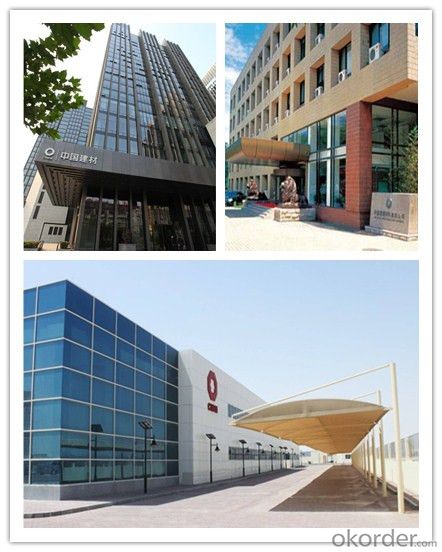
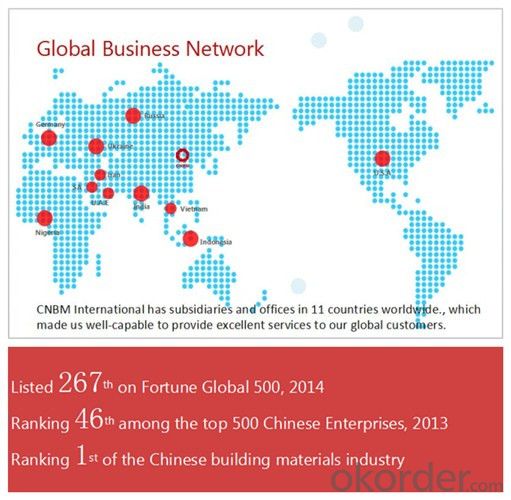
| After-sale service | l CNBM provides the services and support you need for every step of our cooperation. We’re the business partners you can trust; you can relax and get on with doing business. |
| l For any problem, please kindly contact us at any your convenient time, we’ll reply you in our first priority within 24 hours | |
| Advantages | l Industry experience over 20 years. |
| l Shipment of goods -More than 70 countries worldwide. | |
| l The most convenient transport and prompt delivery. | |
| l Competitive price with best service. | |
| l High technical production line with top quality products. | |
| l High reputation based on best quality products. | |
Packaging & Delivery of Special Steel 8620H 40CrNiMoA Iron Round Steel Bar
| Packaging Detail | Sea worthy packing /as per customer's packing instruction |
| Delivery Detail | 15 ~ 40 days after receiving the deposit |
Products Show
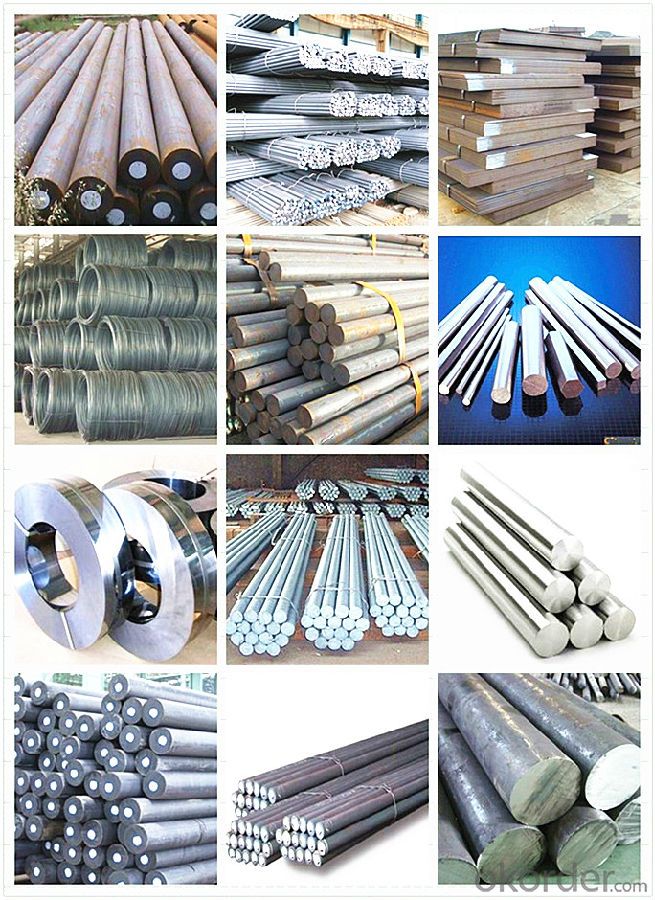
FAQ:
| Are you a trading company or manufacturer? | Manufacturer |
| What’s the MOQ? | 1000m2 |
| What’s your delivery time? | 15-20 days after downpayment received |
| Do you Accept OEM service? | Yes |
| what’s your delivery terms? | FOB/CFR/CIF |
| What's the Payment Terms? | 30% as deposit,70% before shipment by T/T |
| Western Union acceptable for small amount. | |
| L/C acceptable for large amount. | |
| Scrow ,Paybal,Alipay are also ok | |
| Why choose us? | Chose happens because of quality, then price, We can give you both. Additionally, we can also offer professional products inquiry, products knowledge train (for agents), smooth goods delivery, excellent customer solution proposals. |
| What's your available port of Shipment? | Main Port, China |
| What’s your featured services? | Our service formula: good quality+ good price+ good service=customer's trust |
| Where are your Market? | Covering more than 160 countries in the world |
- Q: How does special steel contribute to the waste management industry?
- Special steel plays a crucial role in the waste management industry by providing durable and corrosion-resistant materials for various applications. It is used in the fabrication of waste containers, compactors, and shredders, ensuring their longevity and ability to withstand harsh environments. Additionally, special steel is utilized in incinerators and waste-to-energy plants, where its high heat resistance helps optimize the combustion process. Overall, special steel contributes to the waste management industry by enhancing the efficiency, durability, and sustainability of its equipment and infrastructure.
- Q: What are the different passivation techniques used for special steel?
- There are several passivation techniques used for special steel, including chemical passivation, electrochemical passivation, and mechanical passivation. Chemical passivation involves using acids or other chemicals to remove surface impurities and create a protective oxide layer. Electrochemical passivation uses an electrical current to remove contaminants and promote the formation of a passive layer. Mechanical passivation involves techniques such as shot peening or sandblasting to physically clean and roughen the surface, enhancing its corrosion resistance.
- Q: How is special steel used in the aerospace manufacturing process?
- Special steel is used in the aerospace manufacturing process for various applications, such as producing critical components like landing gear, turbine blades, and engine parts. The high strength, durability, and resistance to corrosion make special steel an ideal material for these aerospace components, ensuring the safety, reliability, and performance of the aircraft.
- Q: How does special steel contribute to the automotive fuel efficiency?
- Special steel contributes to automotive fuel efficiency in several ways. Firstly, special steel is often used in the construction of lighter and stronger components such as the chassis, body panels, and engine parts. This reduces the overall weight of the vehicle, leading to improved fuel economy. Secondly, special steel can be used in the manufacturing of components like exhaust systems, which are designed to reduce emissions and improve fuel efficiency. Additionally, special steel can also be utilized in the production of more efficient engine designs, such as turbochargers, which enhance the power output while minimizing fuel consumption. Overall, the use of special steel in the automotive industry plays a crucial role in enhancing fuel efficiency and reducing environmental impact.
- Q: How does special steel perform in low-temperature applications?
- Special steel performs well in low-temperature applications due to its unique properties such as high strength, toughness, and resistance to brittleness. It retains its mechanical properties even at extremely cold temperatures, making it ideal for industries like aerospace, automotive, and energy where materials need to withstand challenging environments.
- Q: What are the challenges in machining high-speed special steel?
- Machining high-speed special steel poses several challenges, primarily due to its hardness and heat resistance. The high hardness of the steel makes it difficult to cut and shape, requiring specialized tools and techniques. Additionally, the steel's heat resistance can cause excessive heat generation during the machining process, leading to tool wear and reduced cutting performance. To overcome these challenges, manufacturers need to use high-quality cutting tools, employ effective cooling methods, and carefully optimize machining parameters to ensure precise and efficient machining of high-speed special steel.
- Q: What are the requirements for special steel used in agricultural machinery?
- The requirements for special steel used in agricultural machinery vary depending on the specific component or part being produced. However, there are some common requirements that are generally applicable to most agricultural machinery. 1. Strength and durability: Agricultural machinery operates under harsh conditions, such as heavy loads, friction, and exposure to elements. Therefore, special steel used in such machinery must have high strength and durability to withstand these conditions without deformation or failure. 2. Corrosion resistance: Agricultural machinery is often exposed to moisture, chemicals, and other corrosive substances. Special steel used in agricultural machinery should possess good corrosion resistance properties to prevent rusting and degradation over time. 3. Wear resistance: Agricultural machinery components, such as blades, gears, and bearings, undergo repetitive and abrasive actions during operation. Special steel should have excellent wear resistance to ensure prolonged service life and reduce maintenance costs. 4. Toughness: Agricultural machinery encounters sudden impacts, shock loads, and vibrations during operation. Special steel should exhibit high toughness to absorb and resist these forces without fracture or fatigue failure. 5. Machinability: Special steel should have good machinability to enable efficient and accurate machining processes during manufacturing. This includes properties like good formability, weldability, and ease of heat treatment. 6. Cost-effectiveness: While meeting the above requirements, special steel used in agricultural machinery should also be cost-effective. The material should strike a balance between performance and cost, ensuring that the machinery is affordable without compromising quality and performance. Overall, the selection of special steel for agricultural machinery should be based on a comprehensive understanding of the specific application requirements, considering factors such as load capacity, environmental conditions, and expected service life. Meeting these requirements ensures that the agricultural machinery operates efficiently, reliably, and with minimal downtime.
- Q: How does special steel contribute to reducing product defects?
- Special steel contributes to reducing product defects by offering enhanced properties such as increased strength, durability, and corrosion resistance. These properties ensure that the steel components used in various products, especially in critical applications, are less prone to wear, breakage, or malfunction. By using special steel, manufacturers can create more reliable and high-quality products, which ultimately leads to a reduction in defects and improves overall product performance.
- Q: How long does special steel typically last in various applications?
- The lifespan of special steel in various applications can vary depending on several factors. Special steel is known for its exceptional strength, durability, and resistance to corrosion, making it suitable for a wide range of applications. However, the actual lifespan of special steel will depend on the specific application, maintenance practices, and environmental conditions it is exposed to. In general, special steel can last for several decades or even longer when used in industries such as construction, automotive, aerospace, and manufacturing. For instance, in building structures, special steel can last for 50 to 100 years, thanks to its robustness and ability to withstand extreme loads and weather conditions. In automotive applications, special steel components like engine parts, suspension systems, and body frames can have a lifespan of 15 to 30 years, given that they are properly maintained and not subjected to excessive wear and tear. When it comes to the aerospace industry, special steel is commonly used in critical components like turbine blades, landing gears, and fuselage structures. These parts undergo rigorous testing and inspection procedures and are designed to last for decades, typically around 30 to 50 years, before requiring replacement or refurbishment. In manufacturing processes, special steel tools and dies can have a lifespan ranging from a few years to several decades, depending on the intensity of use, the material being processed, and the maintenance practices employed. Proper lubrication, cooling, and regular maintenance can significantly extend the lifespan of these tools. It is important to note that the lifespan of special steel can be adversely affected by factors such as exposure to harsh chemicals, high temperatures, aggressive environments, or inadequate maintenance. Therefore, regular inspections, maintenance, and adherence to recommended usage guidelines are crucial in ensuring the longevity of special steel in various applications.
- Q: How does special steel play a role in the defense sector?
- Special steel plays a crucial role in the defense sector due to its unique properties and characteristics that make it highly suitable for various applications. Firstly, special steel offers exceptional strength and durability, making it ideal for manufacturing military vehicles, armored personnel carriers, and tanks. These vehicles require materials that can withstand high impacts, resist deformation, and provide protection against enemy attacks. Additionally, special steel is used in the production of military aircraft and naval vessels. Its high strength-to-weight ratio allows for the construction of lightweight yet robust structures, enabling aircraft to carry heavy payloads and naval vessels to navigate through harsh conditions. Moreover, special steel's corrosion resistance properties make it suitable for marine environments, ensuring the longevity and reliability of naval assets. Furthermore, special steel is utilized in the production of weapons and ammunition. Its hardness and toughness attributes make it suitable for manufacturing firearm barrels, armor-piercing projectiles, and other critical components. Special steel's ability to withstand extreme pressures, temperatures, and impact forces ensures the accuracy, reliability, and effectiveness of military weaponry. Moreover, special steel is also employed in the defense sector for the production of communication and surveillance equipment. Its electromagnetic properties allow for the fabrication of radar systems, antennas, and electronic enclosures that are essential for military operations. Special steel's resistance to electromagnetic interference ensures the integrity and security of communication systems, enhancing the overall efficiency and effectiveness of defense operations. In summary, special steel plays a vital role in the defense sector by providing the necessary strength, durability, corrosion resistance, and electromagnetic properties required for various applications. Its utilization in military vehicles, aircraft, naval vessels, weapons, and communication equipment enhances the overall capabilities, effectiveness, and safety of defense forces, ensuring national security.
Send your message to us
Special Steel 8620H 40CrNiMoA Iron Round Steel Bar
- Loading Port:
- Qingdao
- Payment Terms:
- TT OR LC
- Min Order Qty:
- 5 m.t.
- Supply Capability:
- 100000 m.t./month
OKorder Service Pledge
Quality Product, Order Online Tracking, Timely Delivery
OKorder Financial Service
Credit Rating, Credit Services, Credit Purchasing
Similar products
Hot products
Hot Searches
Related keywords
